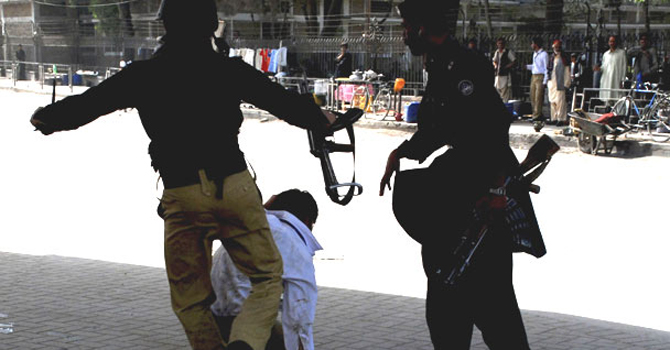ISLAMABAD: “Poorest of the poor and marginalised are the most frequent victims of police torture,” declared Kamran Arif, Co-Chairperson Human Rights Commission of Pakistan, who has been working on creating awareness about non-implementation of the Convention against Torture ratified by Pakistan in 2010.
On Sunday, an 18-year-old milkman, Malik Waqqar Ahmad, died after allegedly being beaten by the police in a private torture cell in Pirwadhai before being dumped at Chandni Chawk, Rawalpindi. According to newspapers, the boy was unable to recover from the brutal torture and died at Holy Family Hospital nine days after being admitted.
According to news sources, he was able to divulge the police brutality much before losing his life. He said: “I was tied with an iron chain in a room and later hanged from the ceiling. I was beaten with iron rods and subjected to severe torture…” Reportedly, his nails were also pulled out and red chili thrown in his eyes.
But Ahmad is no aberration. “This is standard, this is the story that every police torture victim will tell you,” said Rabia Chaudhry, lead researcher at Centre for Public Policy and Governance at Former Christian College, who is researching torture by the police in Pakistan, and was able to deconstruct each decision made by the police in Ahmad’s case.
“In this case, since news reports say, the boy’s employer was the one who got the police involved, it will be less about negotiations or police trying to make money from the kidnapping,” explained Chaudhry. And as such no reports of police demanding money from Ahmad or his family have come to light.
“If the police are planning on keeping the person for longer than 24 hours, then they will take him off the premises to an outhouse so they can stay away from the eyes of higher officers,” she went on.
Ahmad was tortured in a private police torture cell away from the police station.
Next, “the police will follow standard operating procedure; they will either hang him or beat him on the soles of the feet, maybe blindfold him and deprive him of food or water, and try to keep him out of the hospital.” In Ahmad’s case, his condition got critical and the police was forced to dump him.
If a hospital does get involved, and the incident of torture goes public, then this becomes problematic.
“In such a case, the bifurcation of higher and lower police comes into action. The senior police officials, who had until now turned a blind eye to the rampant practice of torture now crack down on the culprits and may even punish them,” explained Chaudhry.
In this case too, the two constables have already been suspended and City Police Officer Azhar Hameed Khokar has also suspended SHO Malik Tahir for not arresting the accused earlier.
But, according to Chaudhry, this does not indicate a step in the right direction. “It’s not that the police are not doing anything about torture, it’s that the number of disciplinary measures that are faced by perpetrators of torture do not correspond at all with the reality on ground,” she asserted.
A manual on reporting of torture by Individualland and Open Society Foundation relates: “According to statistics, 555 suspects were taken into police custody in 2001, 990 in 2002, 838 in 2003, 1,269 in 2004, 1,350 in 2005 and 1,660 in 2006 were locked up or shifted to private torture cells.” Similar numbers are reported for 2007 (1,725), 2008 (1,100), 2009 (1,560) and 2010 (1,640).
And even though Pakistan has ratified the United Nations ‘Convention Against Torture and Other Cruel, Inhuman or Degrading Treatment or Punishment’ in 2010, nothing has changed on the ground even two years later.
“There is a clear method to the entire process of torture in our criminal system, and this is being done since colonial times as far back as the 1800s,” informed Chaudhry.
So any eradication of the practice requires a complete overhaul of the system on a legal, structural and logistical level. “It is important to realise that the problem of torture begins and ends with the police – and the culture of impunity that sustains it is at the centre of the problem,” said Maryam Arif JD, who is a partner at law offices of Maryam and Arif, is researching torture with the support of Open Society Foundation.
“Today, investigative methods have gotten reduced to torture, which can only work in the case of recovery of stolen goods – but in all other cases, torture can only lead to a forced confession which is inadmissible in the court of law,” said Kamran Arif.
“This means that even if criminals are caught, they are not convicted – this explains why our conviction rates stay at a despicable five per cent and why 65 per cent of the prisoners in jails are under trial,” he added.
And yet, torture remains at the centre of the criminal justice system. Today, ‘investigation’, ‘remand’ and ‘evidence’ are all terms that have become synonymous with torture. And as long as this practice remains at the centre, the system will remain ineffective.












































